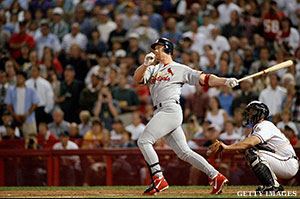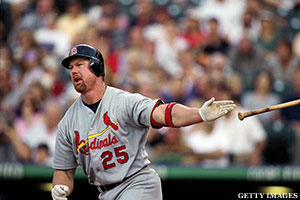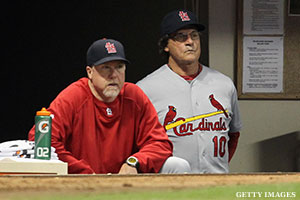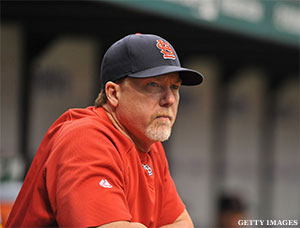The afternoon is late, the last player gone and Mark McGwire leans against a hallway beneath the Busch Stadium stands. He crosses his enormous arms and smiles. The previous three hours have been spent doing the thing he loves most: watching men hit baseballs, offering advice, being a friend, an advisor, a psychologist. Now comes a joy every bit as great.
He gets to talk about hitting.
And the laughter rolls off the concrete corridor.
"I could do this for hours!" he gushes.
He raves about the players he mentors as the St. Louis Cardinals hitting coach, appreciating the way they listen, the way they want to learn, to absorb. His eyes dance as he talked about the way young Daniel Descalso and David Freese and John Jay were forced into increased roles and how they have come to hit and how it seems that everyone is doing something in this year that was supposed to be a disaster for the Cardinals.
McGwire disappeared after those steroid hearings in Washington, the ones during which he dabbed at tears and said he was sorry. And when manager Tony La Russa brought him back and put him together with Mike Aldrete as co-hitting coaches last year, there was speculation that the whole thing would not work out, that McGwire was simply a slugger who didn’t understand the nuances of hitting and that the cloud of steroids would follow him everywhere.
Instead, the questions came fast and went away and McGwire disappeared into the batting cage and the Cardinals hitters got better and better until they had the best batting average and scored the most runs in the National League this year.
"That wasn't an accident," Freese says. "Nothing we do here was an accident. That's Mark McGwire."
But this is not about McGwire. It never really was. La Russa knew this. Having managed him for so long in Oakland and St. Louis, he understood something about his superstar first baseman. McGwire was shy. He hated attention. He hated being the star. And La Russa realized that at some point, when the timing was right, McGwire would make a great hitting coach.
"He doesn’t make it about himself," La Russa says, standing in his office. "That's what makes him a good coach. He doesn't want any publicity, he wants you to get better."

This was probably always going to be the best fit. After the steroids and the congressional hearings and everything else that happened, baseball wasn't calling McGwire and he wasn't begging for the chance to step back into the national glare again. But La Russa has always built a safe house for his men, the ones who have performed for him, the ones who have been most loyal. If someone was going to call for McGwire, it was going to be his old manager.
At the time it seemed like charity, La Russa rescuing his former slugger caught in an endless whirlpool of controversy and hidden behind the walls of a Southern California gated community. But La Russa shakes his head no.
"It wasn't loyalty," he says. "He had a passion for it."
Yet how much could even La Russa know how this would work?
How could he know that Descalso would say as he did Tuesday: "It's been as good as anyone could ask for."

Or Freese would say "I'm so glad he’s here." And that just as he does, Jay would run by and shout, "Me, too!"
This is the test of a coach's impact on his players. How much do they want to hear what he has to say? How excited are they to grab their bats and race to the batting cage and take swing after swing and listen to his evaluations?
He has an ease with them, they say. He's not a coach or an instructor; he's a friend.
"It's never about him, it's just awesome," Freese says. He grew up outside St. Louis watching McGwire play, lying on his bed staring at the TV in 1998 when Big Mac broke the all-time single-season home run record.
And the irony of what he just said made him laugh. It's still so unbelievable. He and Mark McGwire?
Talking hitting?
Yes, he has gushed his teenaged obsession to his hitting coach. McGwire knows his poster was on the wall of Freese's bedroom. And the player has asked so many questions, gotten so many stories. Like the time McGwire broke his bat and kept on hitting balls out at the Home Run Derby. Or that day McGwire got mad at a Jim Joyce call and took off his helmet and stuck it on the handle of the bat? Oh, Freese loved hearing about that one.
Once, during spring training in Jupiter. Fla., McGwire stepped into the cage and took batting practice with them. Soon the old swing was there, balls rocketing off the bat into the warm ocean air. Then came the home runs. Several of them.

"He's still got it," Freese says.
But more importantly, McGwire understands hitting. There was a point early in his career when a job like this would have been unfathomable. "He was a see-it-hit-it guy back then," La Russa says. And even though he hit a lot of home runs in those first few years, he never felt like a complete hitter until he came across Doug Rader in 1992. It was Rader who taught him the finer points of hitting. It was Rader who got him to change his stance and it is Rader who inspired the great renaissance of his career.
No matter what supplements or banned substances might be attached to McGwire's name in the 1990s, Radar made him a complete hitter.
And now McGwire wants to pass these lessons along.
The players in his charge say he spends a lot of time watching them, assessing their strengths and weaknesses, and then he begins his work. But it is never a complete rebuilding. He is not a believer in making everyone follow one system, nor does he think he should adjust a hitter's stance or swing or too much else. Their mechanics got them to the big leagues, he feels. It's their mind that will keep them here.
When McGwire took the job, he told La Russa that he was less interested in the title of "batting coach," that he thought the role should be called "psychologist." Everything is about thinking, he says. So many young players chase a bad pitch and then say they need to change their swing when in reality they simply need to stop swinging at bad pitches. It sounds so easy and yet little in hitting ever is. He figures he can relate to their failures, having stuck out 1,596 times in his 16-year career. He remembers too well in 1991 when he batted .201 and drove home after the games listening to the radio talk shows killing him, certain that at any day he was going to get a call saying he had been sent to the minor leagues.
Certainly he can tell a few young players their lives are not over with a pair of 0-for-4s.
"I think it's more like being a doctor of psychology," he says.
He smiles again.
Laughter fills the hallway.
He is having fun.
Then he is told how much the players in the clubhouse rave about him, how they say he is the reason everything has worked so well this year. He seems moved.
"I really appreciate that," he says. "It's very cool."
And here he was thinking he was coming back to help them and instead they were helping him.






